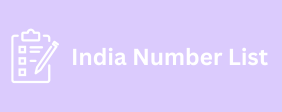If you receive a link penalty, it will be one of two types: a manual penalty or an algorithmic penalty manual and algorithmic link penalties.
Manual penalties are issued by a member of Google’s webspam team. A real person manually reviews your link profile and issues the penalty.
These types of penalties can be triggered by a variety of things, including a spam report from a competitor, being in a competitive niche that Google actively monitors, and sometimes just plain bad luck.
Algorithmic penalties,
On the other hand, are applied facebook database automatically by Google’s Penguin algorithm, without human intervention or review.
These are simply more common because Penguin works in real time (and much faster than humans), always scanning link profiles and weeding out those it doesn’t trust.
But at the end of the day, both types of penalties are equally bad for your website. You should actively work to avoid both. This means using good organic link building tactics to secure only high-quality and relevant links.
These are strategies that Google classifies as manipulative or spammy.
They are the ones you should avoid at all costs if you don’t want to be punished.
Remember that securing good links takes time. If a link opportunity ever feels too easy and too good to be true, it probably is.
1. Link spam
This should obviously be bad when you see it.
Link spam includes ugly URLs or overly optimized hyperlinks inserted into comment sections of random and irrelevant blogs and forums. Sometimes with a brief, meaningless comment that adds no value to the discussion.
These types of comments can be posted using automated software , and it’s something that still occurs regularly in black hat SEO.
It may sound productive to post so many such a system has been successfully links, but don’t be fooled—comment automation leaves a trail of duplicate content all over the internet for Google to track down, and the spammy links won’t help your site in any way.
They won’t provide you with any value because they’re forced and unnatural. They’re often completely irrelevant to both the blog/forum and your own website.
In fact, it’s very likely that you’ll receive a penalty rather than see an SEO boost.
Alternatively, selective commenting on relevant, authoritative blogs and forums in your niche works . It can be an effective method for earning backlinks when supported by white-hat SEO and a broader link-building strategy.
It simply needs to be done manually and only on hyper-relevant pages where you can provide real value to the online community with your link.
And quite simply, spamming your link on every blog and forum you come across is not the way to add any value.
2. Some paid links
Note that I say some , not all , because not all paid links are bad.
There are some, like premium directory listings and relevant editorial links, that are usually fine. But the paid links that are bad are very bad.
In general, Google hates the practice of buying and selling links .
It acts very aggressively against any websites that do this unethically. It has temporarily banned several established, well-known organizations from the SERPs as punishments for this very behavior, including J.C.
Technically, you can buy as many links as you want, but they should be nofollow links, which don’t pass on any link juice to you .
But as a general rule of thumb, don’t just buy links. The exception might be a link from a highly relevant website with good domain authority that will incorporate your link in a natural, valuable way.
3. Private blog networks
Private blog networks (PBNs) are part of a very high-risk, gray-hatted link-building strategy that I would strongly advise against. The potential rewards are not worth the risks.
A PBN is essentially a network of websites, all owned by you, that you use to link to each other and direct link power to the websites that make you money.
PBN websites will have no value for your money-making websites unless they have their own inbound links.
So SEOs who insist on using this strategy usually pay to acquire newly expired domains with existing inbound links and then add fresh content.
This is a little shady, and while there’s still a niche of SEOs who advocate using PBNs for link building, there’s no mistaking it. It’s a pretty manipulative tactic.
Google hates manipulative tactics—that’s exactly what link penalties are for.
4. Links from low-quality or irrelevant websites
This is another fairly obvious example. It contradicts the entire concept of organic link building.
They want to see that your backlinks come from reputable sites that genuinely want to link to you because you provide some value.
This means you need to have some kind of genuine connection with them, usually through outreach and relationship building—or through content that is valuable enough to attract links.
This essentially means that uae cell number links shouldn’t be easy to obtain . Seeking links on websites with low-quality and/or irrelevant content is too easy.
And speaking of irrelevant websites, I should mention here that foreign websites usually fall into this category as well .
If you’re a US website, Google would expect most of your inbound links to also come from the US—or at least from English-speaking countries.
There are, of course, exceptions, such as a large multinational brand with multilingual websites for its customers in different countries .
